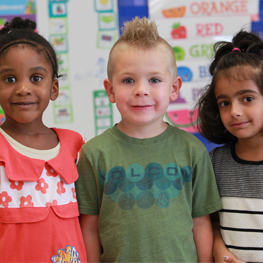
It’s hard to believe how fast the first five years go by, and now the time has arrived for your child to start school. Most children start Kindergarten when they’re four to five years old, and they start Grade 1 when they’re five to six years old.
Your child may be ready to start school and learn new things. They may be excited, nervous, or a little bit of both.
You can support your child to learn and also show them that school’s important with these tips:
Sometimes children can get tired of school once the excitement of a new school year wears off. Your child might feel anxious if they’re not used to being away from you. Your child may even think they’re missing out on important activities at home.
Here are some ways you can help your child adjust to school:
If your child seems upset about going to school, complains about something like a stomachache or a headache, then it’s important to find out more:
Starting school can be a time of change and excitement for you and your child. Your child’s entering a new stage in life and experiencing new things. Enjoy this special time together as your child continues to grow and develop.
For more information about your child’s education, visit education.alberta.ca. For more information about what your child will learn in school, visit learnalberta.ca/content/ mychildslearning/kindergarten.html.
This information contains excerpts from Alberta Health Services’ +Healthy Parents, Healthy Children print and online resources. For more information on topics related to pregnancy and being a parent, and for information on where you can pick up free print copies of the +Healthy Parents, Healthy Children resources, go to healthyparentshealthychildren.ca.
The Healthy Parents, Healthy Children team is a part of the larger Healthy Children and Families’ team at Alberta Health Services. Find them on Facebook at Healthy Parents, Healthy Children or follow on Twitter @AHS_HPHC. For questions or comments, contact This email address is being protected from spambots. You need JavaScript enabled to view it..
Calgary’s Child Magazine © 2024 Calgary’s Child